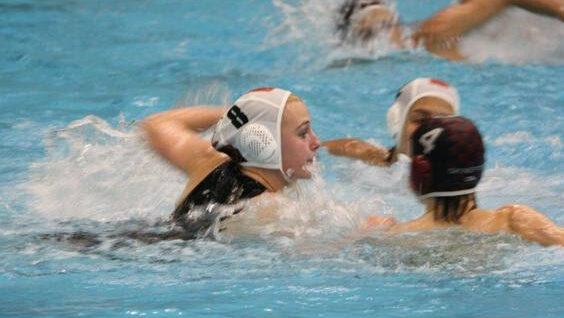Pool talent
While a lot of 14-year-olds want to go to the United States to experience the excitement of New York or visit the thrills of the Universal Studios theme park, Yfke Lotte Reijmer wants to go to Los Angeles. In 2028. To the Olympics.
As a competitor.
That’s right, Yfke, from Grade 9C, has set her sights on representing The Netherlands, playing water polo at the Games of the XXXIV Olympiad – and having just been selected for the Dutch national team in the under-15 age group, she has already taken a major step to getting there.
It’s remarkable then that water polo was not her number one preferred sport to begin with. ‘I was a field hockey player when we lived in New Zealand’ she explains, ‘But that’s not really a big option in Sweden, so I looked around for my second sport options and found a club I could join.’
Swimming is entirely natural to Yfke – she started at 4 years old. And a competitive streak is in her genes, her maternal grandfather having played basketball and football professionally. ‘I do like to win’ she says cheerily, with a beaming smile of self awareness, ‘But when I do lose, it’s a learning experience, I ask myself what I can take from it? How can I improve? And of course water polo is a team sport and you have to also look at how you can improve as a group.’
Back in New Zealand Yfke regularly took part in the Weet-Bix kids Tryathlon Series, and this was good conditioning training for her, but water polo makes intense physical demands on players. A game consisting of four 8-minute quarters may not sound like much, but Yfke gives us an insight on the physicality of the game. ‘You need good leg strength to lift yourself out of the water. You can’t touch the bottom or the side to get lift. You have thirty seconds to score or get an attempt on goal, and if possession is surrendered then you have to urgently swim back the length of a 25-30m pool to defend. It’s exhausting.’
Having moved from New Zealand, how did she ever get on the radar of the Dutch national selectors in the first place? ‘We asked!’ is the surprising answer. Yfke knew there was a relatively open selection process for the national team and emailed them to ask to be included in trials. It was a demanding process. ‘To start they will look at your basic swim times. Then there will be four rounds of trials where they watch you play, and measure your performance in jumping and strength tests. Through that process they select a group of thirty to look at very closely. From that group, the final squad of 17 is selected.’
With such physical demands, there is little down time when Yfke isn’t at school. ‘I train in the pool most evenings 6:30 to 9pm. At the weekends I will do strength work, perhaps going to the gym with my dad. And now I am training with the Dutch team, I have to go back to the Netherlands once a month to fit in some group training. I also spend time watching games on the FINA (the Fédération Internationale de Natation, now rebranded as World Aquatics) website to study tactics and techniques.’
Despite her Olympic ambitions and already having a trophy cabinet to boast of, Yfke doesn’t let herself be distracted from the importance of her educational goals. As she says, ‘You can’t earn a living from water polo. And you peak physically in the game in your mid-twenties probably.’
She would like to study medicine, perhaps not surprisingly drawn to cardiology and the respiratory system given the demands she makes on herself. Though that love of the game still peeps through when you ask where she would like to study: ‘Perhaps the USA – water polo is huge there! Or Spain – it’s big there and much easier to hook up with the national team!’
We wish Yfke much success in her next match tonight when she takes to the pool for the Netherlands.









